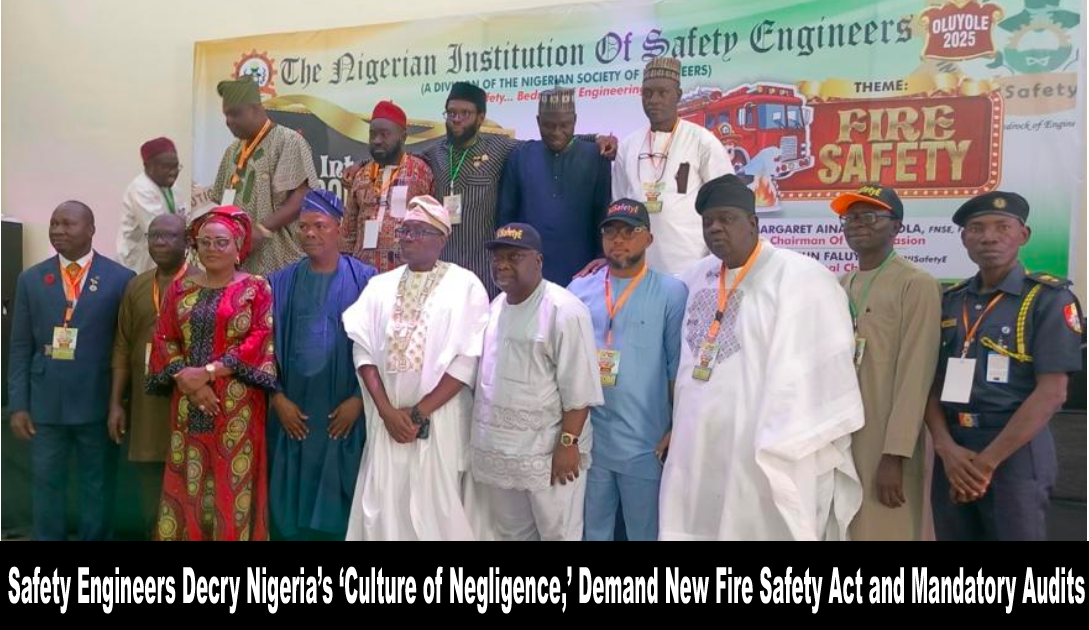12 October, 2025
Admin

Front row From L-R: Engr Dr Andrew Abanum (DNC), Engr Azuka Emeasoba, former NC, Rep of Dr Daud Shangodoyin, Commisioner of Works, Mrs Ronke Akinyemi, Rep of Engr Margaret Oguntala, NSE President, Engr Ojelabi, Ibadan Branch Chairman, Engr Seun Faluyi, NC, Sen Iyiola Omisore, former Osun State Deputy Governor, Engr Akaninyene Ekong, IPNC, Engr Biodun Oyedepo, pioneer NC, Engr Oládayò Awódélé, pioneer Chairman, Oyo State chapter, Rep of Olumode Samuel Adeyemi, CG, FFS, Engr Sarki Abdurahman
The Nigerian Institution of Safety Engineers, NISafetyE, has expressed concern over Nigeria’s culture of negligence, outdated legislation, and poor infrastructure; they warned that the nation faces a constant risk of preventable tragedies.
The calls came during the 10th International Conference and Annual General Meeting of the Nigerian Institution of Safety Engineers (NISafetyE) held on October 10, 2025, in Ibadan, Oyo State.
The National Chairman of NISafetyE, Engr. Oluseun Faluyi, in his welcome address, observed that this year conference is coming at a time when “Nigerians are asking tough questions about fire safety.”
He stated that most of the nation’s fire incidents “are not mysteries,” but are primarily caused by faulty electrical wiring, careless handling of gas, and a poor maintenance culture. He also cited incidents of unsafe practices such as “High-rise offices with blocked stairways, homes without smoke alarms, public spaces with no fire extinguishers in sight.”
He also mentioned emerging, silent threat: inverter batteries and lithium storage systems. He cautioned that if large battery banks are “squeezing… into small, unventilated rooms,” they become “ticking time bombs” due to dangerous heat build-up.
Engr, Faluyi drew attention to the critical gap between regulation and reality and warned that “a law that is not enforced is just ink on paper.” He revealed that the NISafetyE is currently advocating for “regular, independent, professional, mandatory safety audits of every public building.” He stated that any building that “cannot pass a fire safety test, it has no business opening its doors to the public.”
He also drew attention to the poor state of fire services across the country. He said that Nigeria’s firefighting heroes are often forced to “fight modern fires with outdated trucks, with no breathing apparatus, with no protective clothing.”
Engr. Dr. Iyiola Omisore, a former Deputy Governor of Osun state and ex Senator, in his keynote address, stressed that fire and safety is not an abstract discussion but is about “human lives, national assets, generational wealth, and the future of our children.” According to him, the “cheapest fire to fight is the one that never starts,” .
He recalled some past national fire tragedies, including the 1998 pipeline explosion in Jesse where over 1,000 lives were lost, alongside frequent market and petrol tanker infernos.
Senator Omisore blamed most of the incidents on human negligence like illegal fuel storage and overloaded electrical connections. According to him, “Any development without safety is a development designed for failure.” He therefore called for the strict enforcement of the National Building Code.
The former APC National General Secretary detailed the devastating risks across several sectors. He labelled Industrial Safety as “national security,” and demanded that refineries and oil depots be equipped with modern fire suppression systems and trained, specialized industrial fire brigades.
For Transport and Aviation, he called for mandating double-hull tankers on roads and establishing maritime fire safety units and emergency foam systems in airports. He suggested 24-hour standby firefighting units in hospitals. For Markets and Schools, he called for an end to markets operating as “graveyards of goods and lives,” and called for installation of fire hydrants, functional water supply, rapid access routes, and market-level fire brigades. He recommended that schools must teach life-saving fire drills.
Senator Omisore called for an overhaul of the institutional framework. According to him, Nigeria’s Fire Service Act (1963) is outdated. He reiterated the need for a modern comprehensive Fire Safety Act that clearly defines roles, establishes minimum safety standards, provides funding, and enforces compliance. He added that “Safety must not be optional—it must be law.”
Omisore described firefighters as heroes who lack modern training and equipment and called for investment in National Fire Training Academies and international exchange programs. He explained that a well-trained firefighter is a national asset. He also urged the nation to embrace technology and innovation, citing the need for AI-driven fire risk modeling, drones for aerial firefighting, and robotic fire suppressors.
Omisore urged all stakeholders—government, the private sector, and communities—to embrace responsibility. “Investing in fire safety is investing in our people, our economy, and our future; no society can afford the cost of negligence,” he said. “Every life saved through safety is a monument to leadership.” He concluded
Also speaking at the event, the Controller General of the Federal Fire Service, Olumode Samuel Adeyemi, who was represented by the head, Plans Examination Division of the agency, Sarki Abdulrahman, said the agency is currently undergoing massive restructuring and modernisation to ensure international best standards, targeting fire prevention and willful compliance with fire safety regulations.
According to him, “There are fire services that are operation-focused, and there are fire services that are focused on prevention, which is our new direction.” He added that the focus of the administration is on prevention because “the best approach is to prevent fire first, even though we cannot prevent every fire.”
Other speakers who spoke at the event are. Mrs. Anthonia Bari, MD, Safety Consultants and Solution providers Limited, Engr Osolima Mac-Jaja, Chairman of NISafetyE Lagos Chapter and Engr Mary Umoh, Vice Chairman Akwa Ibom Chapter.
